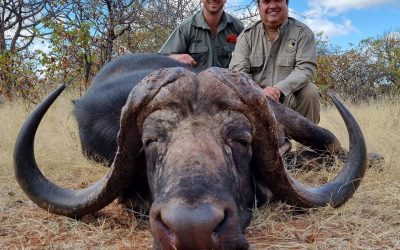So, you’ve always had a fascination with hunting, but you’re relatively new to the game. The wild, untamed landscapes of Africa have captured your imagination, and you find yourself wondering if there are opportunities for beginners like yourself to venture into the thrilling world of African hunting. Well, fear not, because in this article, we are going to explore the possibilities, resources, and experiences that await those who are eager to embark on their first hunting expedition in Africa. Get ready to unleash your inner adventurer and discover the enchanting realm of African hunting!
Introduction
If you are a beginner hunter with a desire to discover the thrill of hunting in Africa, you may be wondering if there are opportunities available for you. Africa has long been a popular destination for hunting enthusiasts, and whether you are a novice or an experienced hunter, there are various options and experiences to suit your skill level. In this comprehensive article, we will explore the world of hunting in Africa, from its history to selecting a hunting destination, finding reputable guides, preparing for the hunt, and managing expectations. By the end, you will have a better understanding of what it takes to embark on an African hunting adventure.
Understanding Hunting in Africa
The history of hunting in Africa
Hunting has deep historical roots in Africa, dating back thousands of years when it was a crucial part of survival for indigenous communities. Historically, hunting was not just for sustenance, but also played a significant role in cultural practices and rites of passage. Today, hunting in Africa has evolved into a regulated activity that contributes to wildlife conservation efforts and provides economic benefits for local communities.
Types of hunting experiences in Africa
Africa offers a diverse range of hunting experiences, catering to both rifle and bow hunters. The most common types of hunting experiences include plains game hunting, safari hunting, and dangerous game hunting. Plains game hunting involves pursuing animals such as antelope, wildebeest, and zebra, while safari hunting allows hunters to target a wider variety of species, including big game like buffalo and leopard. Dangerous game hunting, on the other hand, provides the ultimate adrenaline rush, as hunters track and take down formidable creatures like lions, elephants, and rhinos.
Regulations and legal requirements for hunting in Africa
Before embarking on a hunting adventure in Africa, it is essential to familiarize yourself with the regulations and legal requirements of the specific country you plan to visit. Each African country has its own set of hunting regulations, including hunting seasons, quotas, and firearm restrictions. It is crucial to obtain the necessary permits and licenses, ensuring compliance with local laws and regulations. Hunting outfitters and guides are valuable resources when it comes to navigating these legal requirements, as they have the knowledge and expertise to assist you in obtaining the necessary documentation.
Choosing a Hunting Destination
Popular hunting destinations in Africa
Africa is vast and diverse, offering numerous hunting destinations that cater to all skill levels. Some of the most popular hunting destinations include South Africa, Namibia, Zimbabwe, and Tanzania. South Africa is particularly renowned for its accessibility, abundant game species, and well-established hunting infrastructure. Namibia, with its breathtaking landscapes and diverse wildlife, offers a unique hunting experience. Zimbabwe is famed for its big game hunting opportunities, while Tanzania boasts vast hunting concessions and the chance to hunt iconic species such as lions and elephants.
Factors to consider when selecting a hunting destination
When choosing a hunting destination in Africa, there are several factors to consider. The species you wish to hunt, budget, travel logistics, and personal preferences all play crucial roles in your decision-making process. Researching the hunting regulations, terrain, and climate of potential destinations is vital to ensure a successful and enjoyable experience. Additionally, take into account the reputation and track record of the hunting outfitters and guides operating in the area, as they will greatly influence the overall quality of your hunt.
Recommended countries for beginner hunters
For beginner hunters looking to dip their toes into African hunting, South Africa and Namibia are often highly recommended destinations. They offer a wide variety of game species, comfortable hunting accommodations, and well-established hunting operations. These countries provide a conducive environment for beginners to learn and develop their hunting skills while enjoying a memorable hunting experience. The availability of knowledgeable guides and outfitters who specialize in catering to beginners further enhances the overall experience.
Finding Hunting Guides and Outfitters
The role of hunting guides and outfitters
Hunting guides and outfitters play a vital role in ensuring a successful and enjoyable hunting experience in Africa. They possess extensive knowledge of the local environment, wildlife behavior, and hunting techniques, providing invaluable guidance throughout the hunt. Guides are responsible for navigating the hunting areas, tracking game, and assisting with shot placements. Outfitters, on the other hand, handle logistics such as accommodations, transportation, and obtaining necessary permits. Together, they form a cohesive team dedicated to enhancing your hunting adventure and ensuring your safety.
Researching and selecting reputable guides
When it comes to selecting hunting guides and outfitters in Africa, conducting thorough research is crucial. Start by seeking recommendations from experienced hunters or trusted resources within the hunting community. Look for guides and outfitters who have a proven track record of successful hunts, positive reviews, and a commitment to ethical hunting practices. It is also important to communicate your specific needs and expectations to potential guides, ensuring that they align with your hunting goals. Booking through reputable hunting associations or agencies can also provide an added level of assurance.
Services and support provided by guides
Hunting guides and outfitters offer a range of services and support to enhance your hunting experience. In addition to guiding you during the hunt, they often assist with field dressing, skinning, and preparing trophies for shipment or taxidermy. Guides are typically equipped with essential tracking and recovery equipment, ensuring that any game taken is found and utilized responsibly. They also possess extensive knowledge of local wildlife ecology, providing valuable insights into the behavior and habitats of different species. The support and expertise of guides can significantly contribute to your success as a hunter.
Preparing for the Hunt
Obtaining necessary permits and licenses
Before embarking on your hunting adventure in Africa, it is crucial to obtain all necessary permits and licenses. This process can vary depending on the country and species you intend to hunt. It is essential to research and familiarize yourself with the specific requirements and regulations in your chosen hunting destination. Hunting outfitters and guides are well-versed in these procedures and can assist you in obtaining the appropriate documentation, ensuring compliance with local laws and regulations.
Understanding the local environment and wildlife
One of the most important aspects of preparing for a hunt in Africa is gaining an understanding of the local environment and wildlife. Research the terrain, climate, and vegetation of the hunting area, as this will impact your hunting strategies and gear selection. Familiarize yourself with the behavior and habits of the game species you intend to pursue. Understanding the ecology of your target species will enable you to make informed decisions while hunting and increase your chances of success. Engaging with local conservation organizations or specialized guides can provide valuable insights into the local wildlife and ecosystem.
Choosing suitable hunting equipment and gear
Selecting the right hunting equipment and gear is essential for a successful and ethical hunt in Africa. Rifles or bows should be calibrated to the appropriate caliber or draw weight for the intended game species. Optics such as binoculars and scopes play a crucial role in accuracy and target identification. Additionally, investing in quality clothing and footwear designed for the local climate and terrain is important for comfort and stealth. Consult with experienced hunters or your chosen guide to ensure you have the necessary equipment and gear for a productive hunting experience.
Training and Skill Development
Building marksmanship and shooting skills
Developing good marksmanship and shooting skills is vital for a successful hunting experience in Africa. Practice regularly at the shooting range to hone your accuracy and become comfortable with your chosen firearm or bow. Familiarize yourself with shooting positions and techniques commonly used in hunting scenarios, including shooting from different angles and distances. Taking a marksmanship course or seeking guidance from experienced hunters can provide valuable insights and help you improve your shooting skills.
Learning tracking and scouting techniques
Tracking and scouting techniques are essential skills for a successful hunt in Africa. Learning to read tracks, signs, and animal behavior can greatly increase your chances of locating and approaching your target species. Familiarize yourself with the basics of tracking and scouting, including identifying tracks, game trails, and feeding areas. Practice these skills in your local environment before your African hunting adventure to build your confidence and proficiency. Engaging with guides or joining local tracking and scouting workshops can provide valuable hands-on experience in honing these skills.
Understanding ethical hunting practices
Ethical hunting practices are crucial for preserving wildlife populations and maintaining the integrity of ecosystems. As a beginner hunter in Africa, it is important to understand and adhere to these practices. This includes taking responsible and ethical shots to ensure a quick and humane kill, respecting hunting regulations and quotas, and utilizing harvested game responsibly. Engage with experienced hunters, conservation organizations, or hunting associations to gain a better understanding of ethical hunting principles and guidelines specific to your hunting destination.
Safety Considerations
Understanding potential risks and hazards
Safety should always be a top priority during any hunting expedition, and hunting in Africa is no exception. Understand the potential risks and hazards associated with hunting in unfamiliar environments, including wildlife encounters and challenging terrain. Familiarize yourself with the local wildlife, especially dangerous game species, and learn how to react if confronted. Educate yourself on venomous snakes and other potential dangers that may be present in the hunting areas. Remain vigilant and follow your guide’s instructions to minimize risks and ensure a safe and enjoyable hunting experience.
First aid and emergency preparedness
Being prepared for emergencies is crucial when venturing into remote hunting areas in Africa. Ensure you have a well-stocked first aid kit and familiarize yourself with basic first aid procedures for common injuries such as cuts, sprains, or bites. Consider taking a wilderness first aid course or obtaining a certification in first aid to enhance your emergency response skills. Communicate your medical history or any existing conditions to your guide or outfitter, as they may impact your ability to handle certain situations. Being prepared and knowledgeable can help avoid or mitigate potential emergencies.
Adhering to firearm safety protocols
Firearm safety is paramount when participating in a hunting adventure. Adhere to strict firearm safety protocols at all times, ensuring that firearms are always pointed in a safe direction and never loaded until ready to shoot. Familiarize yourself with the specific firearm laws and regulations of your chosen hunting destination, including transportation requirements and storage guidelines. Ensure your firearm is well-maintained and in proper working condition before your hunt. By prioritizing firearm safety, you not only protect yourself and others but also contribute to the overall safety culture of hunting in Africa.
Costs and Budgeting
Factors influencing the cost of a hunting trip
The cost of a hunting trip in Africa can vary depending on several factors. Game species, hunting duration, accommodation type, and additional services all contribute to the overall cost. Big game hunting, especially for dangerous species, tends to be more expensive due to their limited availability and higher trophy fees. The number of hunting days and the level of luxury in accommodations can significantly impact costs. Consider these factors when planning your trip and ensure you have a realistic budget in mind to avoid any financial surprises.
Budgeting for accommodation, transportation, and trophy fees
Accommodation, transportation, and trophy fees are essential components to consider when budgeting for an African hunting trip. Safaris often offer a range of accommodation options, from tented camps to luxury lodges, with varying price points. Transportation costs include flights to and within Africa, as well as ground transportation to the hunting area. Trophy fees vary depending on the species hunted and can add a substantial cost to the overall trip. Research and compare different options to ensure you choose accommodations, transportation, and trophy fees that align with your budgetary constraints.
Additional expenses to consider
In addition to accommodation, transportation, and trophy fees, there are other expenses to consider when planning your African hunting adventure. These may include travel insurance, firearm import or rental fees, taxidermy services, gratuities for guides and staff, and additional activities or sightseeing opportunities before or after the hunt. It is important to factor in these costs to ensure you have a complete understanding of the financial commitment required for your hunt. Consult with reputable hunting outfitters or experienced hunters for a comprehensive breakdown of potential expenses, allowing you to plan accordingly.
Managing Expectations
Understanding the unpredictability of hunting
Hunting is an unpredictable activity, and it is important to manage your expectations accordingly. While African hunting offers incredible opportunities, it is impossible to guarantee a successful hunt every time. Wildlife behavior, weather conditions, and other uncontrollable factors may impact your ability to locate and harvest game. Approach your African hunting adventure with an open mind and be prepared to adapt to the circumstances. Remember that the experience itself, immersing yourself in the African wilderness, and learning from experienced guides are valuable aspects of your journey, regardless of the outcome.
Realistic expectations for a beginner hunter
As a beginner hunter, it is important to set realistic expectations for your African hunting experience. Understand that hunting is a skill that takes time and practice to develop fully. While you may not achieve the same level of success as more experienced hunters, focus on learning and improving your hunting techniques. Embrace the opportunity to observe wildlife, understand their behavior, and immerse yourself in the unique African landscape. Celebrate each small victory and use your hunting adventure as a platform for growth and personal development as a hunter.
Embracing the overall experience beyond the hunt
Hunting in Africa is not solely about harvesting a trophy or achieving a high success rate; it is about the overall experience and connection to the natural world. Embrace all aspects of your African hunting adventure, from encountering diverse wildlife and appreciating breathtaking landscapes to learning about local cultures and traditions. Engage with your hunting guides, fellow hunters, and local communities, fostering relationships that extend beyond the hunt. Ultimately, African hunting offers an opportunity for personal growth, cultural exchange, and lifelong memories that go far beyond the act of pulling the trigger.
Recommendations for Beginner Hunters
Seeking guidance from experienced hunters
As a beginner hunter in Africa, seeking guidance from experienced hunters can greatly enhance your hunting skills and overall experience. Reach out to hunters who have previously embarked on African hunting trips and ask for their advice and insights. Many experienced hunters are willing to share their knowledge and provide valuable tips to help newcomers navigate the unique challenges and opportunities of hunting in Africa. Engage with hunting communities, online forums, and social media groups to connect with experienced hunters who can mentor and guide you through your journey.
Joining hunting associations and communities
Joining hunting associations and communities can offer a wealth of resources and support for beginner hunters in Africa. These organizations provide a platform for connecting with fellow hunters, sharing experiences, and accessing valuable educational materials. They often organize events, workshops, and mentoring programs, allowing beginners to learn from seasoned hunters. By becoming an active member of these associations and communities, you will not only expand your knowledge and skills but also forge meaningful connections with like-minded individuals who share your passion for hunting in Africa.
Starting with smaller game before pursuing larger trophies
For beginner hunters, it is advisable to start with smaller game species before pursuing larger, more challenging trophies. This approach allows you to develop your hunting skills, gain confidence, and understand the intricacies of African hunting without overwhelming yourself. Pursuing smaller game offers a chance to refine your marksmanship, tracking techniques, and shooting skills before taking on more significant and potentially dangerous game. The lessons learned during encounters with smaller game will serve as a solid foundation for your future hunting endeavors in Africa.
In conclusion, hunting opportunities for beginners in Africa do exist and can provide memorable and rewarding experiences. Understanding the history, types of hunting experiences, and legal requirements are crucial for embarking on an African hunting adventure. Choosing a suitable hunting destination, finding reputable guides, and preparing adequately contribute to a successful hunt. Skill development, safety considerations, and managing expectations ensure an enjoyable and responsible hunting trip. By following recommendations from experienced hunters, joining hunting associations, and starting with smaller game, beginners can make the most out of their African hunting journey.










